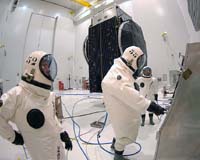 |
Dubai, United Arab Emirates (UPI) Aug 21, 2009 The United Arab Emirates, a key U.S. ally in the Gulf locked in a territorial dispute with Iran, is working on developing an indigenous surveillance satellite program that will have strategic implications for the seven-state federation. The U.A.E., a regional leader in the telecommunications sector, launched its first remote-sensing satellite, DubaiSat-1, on July 29 from the Baikonur Cosmodrome, the former center of the Soviet space program. The satellite, carried in the nosecone of a Russian Dnepr rocket, was lofted into orbit 425 miles above the Earth, where its solar panels were deployed. These will power DubaiSat for five years, its expected operating life. The Emirates Institution for Advanced Science & Technology reported on Aug. 8 that it had received the first images transmitted from the satellite. The institution, which runs the satellite program, said the satellite will be used for a variety of applications, ranging from scientific research and telecommunications to urban development and mapping. However, the military forces of the six-nation Gulf Cooperation Council, of which the U.A.E. is a member, have been seeking to develop or acquire military surveillance satellite systems to bolster their joint early warning network since 2001. That would greatly enhance the defense capabilities of the U.A.E., and the GCC as well. The U.A.E. has built up a powerful military, particularly in the air, over the last decade as well as a home-grown defense industry. It is also looking to establish itself as the space technology hub in the region and has had dealings with foreign companies that specialize in military satellites. The emirates, dominated by Dubai and Abu Dhabi, have long sought to be the first Gulf state to boast a space program. In September 1997 Hughes Space and Communications International of the United States signed a $1 billion communications satellite deal, at that time the Arab world's largest satellite contract, with the Abu Dhabi-based Thuraya Satellite Telecommunications Organization, which groups investors in 14 Arab states. Thuraya is one of the biggest telecommunications companies in the Middle East. Its main shareholder is the U.A.E.'s state-run Emirates Telecommunications Co., or Etisalat. That deal, Hughes' first in the Arab world, edged out Lockheed Martin and France's industrial giant Aerospatiale and ended the monopoly of the Middle East's satellite industry, which had been held by Aerospatiale. The French company had launched the Arab world's five communications satellites operated by the Arab Space Telecommunications Corp., known as Arabsat. Dubai-1 was built by a South Korean company, Satrac Initiative, aided by 16 U.A.E. engineers. DubaiSat-2 will be built at a new facility in the emirates. The U.A.E. is attracting outside investors for its nascent space program, which is to be showcased at the second Global Space Technology Forum to be held in Abu Dhabi on Dec. 7-9. It's the first dedicated forum for space technologies in the Middle East. "The forum will bring together the industry's key players and other world-leading space agencies and programs, to share ideas, knowledge and progress," said EIAST Project manager Salem al-Marri. "Next-generation space research and commercial space applications present huge opportunities for everyone involved in this sector." The keynote speech at the first forum in November 2008 was given by Martin Sweeting, chairman of the British mini-satellite builder Surrey Satellite Technology Ltd., which launched military satellites for Algeria and Turkey. Other international companies are also zeroing in on the U.A.E. to develop satellite business in the Gulf. These include 4C Controls, a New Jersey-based satellite concern established by several French space industry executives that is specifically targeting the Gulf region. The outfit is headed by Jean-Robert Martin, a former managing director of the defense division of French company Thales. Among its other executives are Philippe Aubrey, one of the architects of France's Helios military surveillance satellite, and Anne-Marie Perus, who worked for the global security division of European defense giant EADS. In August 2008 Gen. Khalid Abdullah Mubarak al-Buainain, the former commander of the U.A.E. air force, was named 4C Control's vice president for the Middle East. In October 2008 4C Controls bought a majority share in U.A.E. security equipment manufacturer Zahra Technology LLC. Share This Article With Planet Earth
Related Links The latest information about the Commercial Satellite Industry
 LockMart JCSAT-12 Satellite Ready To Be Launched For SKY Perfect JSAT
LockMart JCSAT-12 Satellite Ready To Be Launched For SKY Perfect JSATNewtown PA (SPX) Aug 21, 2009 The JCSAT-12 communications satellite, designed and built by Lockheed Martin for SKY Perfect JSAT Corporation (SKY Perfect JSAT) of Japan, is ready for its scheduled launch on Aug. 21 aboard an Ariane 5-ECA launch vehicle provided by Arianespace. The launch window opens at 6:09 p.m. EDT and closes at 7:09 p.m. EDT. JCSAT-12 is a high-power hybrid satellite consisting of 30 active Ku-band ... read more |
|
| The content herein, unless otherwise known to be public domain, are Copyright 1995-2009 - SpaceDaily. AFP and UPI Wire Stories are copyright Agence France-Presse and United Press International. ESA Portal Reports are copyright European Space Agency. All NASA sourced material is public domain. Additional copyrights may apply in whole or part to other bona fide parties. Advertising does not imply endorsement,agreement or approval of any opinions, statements or information provided by SpaceDaily on any Web page published or hosted by SpaceDaily. Privacy Statement |